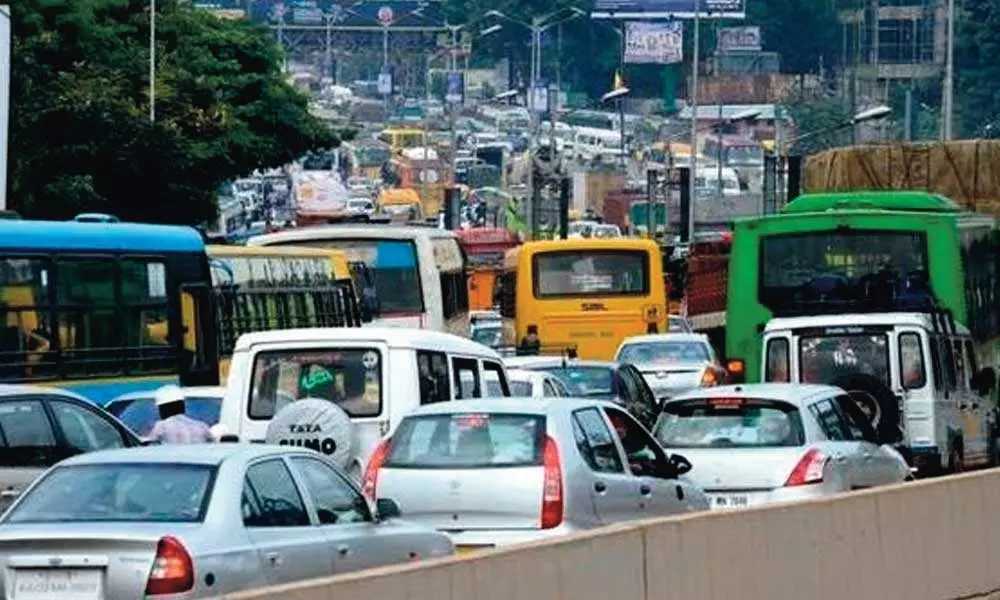Young techies develop solution for Bengaluru traffic

Young techies develop solution for Bengaluru traffic
The Mobility Champions program, hosted by Young Leaders for Active Citizenship (YLAC) in partnership with the #BengaluruMoving campaign, World Resources Institute India (WRI) and Let Me Breathe (LMB) has proposed three unique solutions aimed at solving Bengaluru’s traffic woes
Bengaluru: The Mobility Champions program, hosted by Young Leaders for Active Citizenship (YLAC) in partnership with the #BengaluruMoving campaign, World Resources Institute India (WRI) and Let Me Breathe (LMB) has proposed three unique solutions aimed at solving Bengaluru's traffic woes. The program, started on July 25, has worked with 12 passionate young residents of the city – to suggest promising mobility solutions and garner support from policy makers and citizens.
The Mobility Champions program is part of the wider 'Bengaluru Moving' campaign, which is aimed at highlighting the challenges of public transport in Bengaluru and the need for better first and last mile connectivity, while championing bus lanes, non-motorised transport (NMT) solutions and investment in urban transport infrastructure.
Taking note of the burgeoning number of two-wheelers in the city, which exceeds 50 lakh, the mobility champions have recommended their better utilization for building a robust first and last mile solution by considering the legalisation of bike taxis. As a first step, the government could set up a Regulatory Sandbox where new mobility service providers like bike taxi operators can pilot their services in a limited geography for a specific time period. This pilot can then be assessed to gauge the potential of these services in reducing congestion. Additionally, optimization of BMTC routes and adding new metro feeder buses to provide first and last mile connectivity between IT Parks and metro stations, while maximizing bus lanes are some of the prominent recommendations put forward. Talking about the importance of micro-transit, Febin Sagir, a Mobility Champion said, "Micro-transit services can complement the mass transit (bus, metro, sub-urban rail) network as a means for first-mile and last-mile connectivity and help increase adoption of public transportation. "
For a large number of people in Bengaluru, walking is the primary mode of commute. It is estimated that over 28% of all trips in Bengaluru are undertaken by walking, one of the highest among the metro cities in India. In the wake of the global pandemic, emphasis on socially distant non-motorized transport (NMT) is seeing resurgence across the world. In line with this, the Mobility Champions have recommended a two-pronged approach which makes streets safe and footpaths a sought-after mode of commute while enticing people to pick bicycles over motorized transport. Their solution comprises a combination of better urban design for improved connectivity and a well spread out infrastructure for bicycle lanes.
Sharing his thoughts on the program, Jaison Jose added, "The Mobility Champions program provided us with a platform to engage with NMT developments in the city and to work with prominent stakeholders such as the Bicycle Mayor and the Department of Urban Land Transport to bolster the ongoing efforts. Our main objective was to build support for NMT in Bengaluru, a city where the weather and terrain are both conducive to cycling and walking."
For a city with a growing population of non-native speakers, information availability at bus stops or on apps in English as well as Kannada has become increasingly important. To aid this set of commuters, the Champions have also put forth recommendations for building a consistent, citizen centric and integrated pathfinding system for the city i.e. designing information systems such that they are: i) INCLUSIVE to take into consideration the needs of each and every citizen; ii) ACCESSIBLE to all, both online and offline; iii) RELIABLE, where accurate information on public transport is available to everyone to reduce uncertainty and enhance ease of travel; and iv) RESPONSIVE, where mechanisms are in place to address grievances and ensure safety of travelers.
Khushal Wadhawan, a champion working on this initiative, said, "To retain and increase the mode share of public transport, it is essential that the users are provided with real-time, accurate and reliable information on public transport operations. This will help public transport develop as a real alternative to private transport and would ultimately lead to less vehicular density and congestion on Bengaluru's streets"

